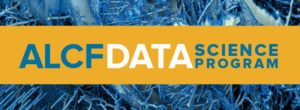 ALCF Data Science Program
ALCF Data Science Program
The Argonne Leadership Computing Facility Data Science Program (ADSP) is now accepting proposals for projects hoping to gain insight into very large datasets produced by experimental, simulation, or observational methods. From now to June 15 2017, ADSP’s open call provides an opportunity for researchers to make transformational advances in data science and software technology through allocations of computer time and supporting resources at the Argonne Leadership Computing Facility (ALCF), a U.S. Department of Energy Office of Science User Facility.
Call for Proposals
The call for proposals opens April 24, 2017, and ends on June 15, 2017, 5:00 PM CST. Please see the proposal instructions for more information.
The ADSP, now in its second year, targets “big data” science problems that require the scale and performance of leadership computing resources, such as ALCF’s two petascale supercomputers: Mira, an IBM Blue Gene/Q, and Theta, an Intel/Cray system that came online earlier this year. ADSP projects are two-year awards. PIs will be required to fill out a renewal application for each allocation period of the award.
[Proposal Instructions]Program Overview
ADSP projects will focus on employing leadership-class systems and infrastructure to explore, prove, and improve a wide range of data science techniques. These techniques include uncertainty quantification, statistics, machine learning, deep learning, databases, pattern recognition, image processing, graph analytics, data mining, real-time data analysis, and complex and interactive workflows. The winning proposals will be awarded time on ALCF resources and will receive support and training from dedicated ALCF staff. Applications undergo a review process to evaluate potential impact, data scale readiness, diversity of science domains and algorithms, and other criteria. This year, there will be an emphasis on identifying projects that can use the architectural features of Theta in particular, as future ADSP projects will eventually transition to Aurora, ALCF’s 200-petaflops Intel/Cray system expected to arrive late next year.
Computing Platforms
ADSP project teams will have access to ALCF computing resources, including Theta, the 9.65-petaflops Cray XC40 system using Intel Xeon Phi 2nd Generation processors, Mira, as well as visualization and analytics clusters, and storage systems.
ADSP Resouces
- Staff and Postdoc Support: The chosen ADSP projects will receive part-time support from ALCF staff. In addition, the ALCF will hire two postdocs to work directly with the ADSP projects.
- Training and Hardware Access: ALCF will offer targeted training for the ADSP projects. Depending on the requirements of the projects, this training is likely to include a detailed introduction to the hardware and software stack, access to early hardware, deep dives on specific hardware features, and customized tutorials.
- Computing and Storage Resources: ADSP projects will be awarded compute time and storage space on Theta. The initial compute time awards are expected to range from 50 million core-hours to 150 million core-hours. Awards for the second year will be based on the proposal and consultation with the project. Storage requirements may be up to 100 terabytes, and any additional project needs could be accommodated in consultation with the ALCF.
Reporting Requirements
ADSP project teams are expected to provide quarterly progress reports, participate in update calls, collaborate with ALCF staff, help prepare highlights of notable accomplishments and results, and provide a written report at the end of the project.
